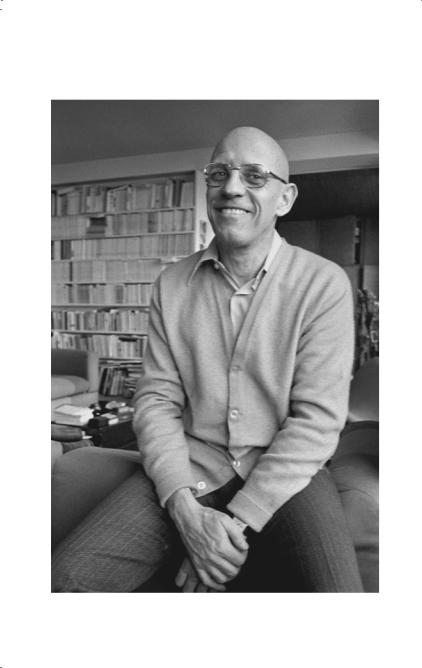
Foucault - A Very Short Introduction
.pdf
Foucault
sexual nature are not self-chosen but accepted on the authority of ‘experts’ in the new modern sciences of sexuality: the Freuds, the Kraft-Ebbings, the Havelock Ellises, the Margaret Meads. Such experts present as discoveries about human nature what are actually just new social norms for behaviour.
Of course, there is a distinction between sexuality as a social construct and sex as a biological reality. Foucault does not deny that there are, for example, undeniable physiological facts about human reproduction. But he maintains that once we move from sheer biology to the inevitably hermeneutic and normative concepts of psychology, anthropology, etc., the distinction breaks down. The Oedipal complex, for example, is tied to assumptions about the meaning and value of the bourgeois family; it is not just another fact, like the physiology of conception. Even what seem to be simple biological facts, for example, the distinction of male and female, can turn out to have normative social significance, as is demonstrated by the case of Herculine Barbin, a 19th-century hermaphrodite, who was raised as a female but, in her twenties, came under the scrutiny of doctors who decided that she was in fact a man and forced her to live as one. Foucault published the poignant memoirs Barbin wrote before committing suicide at the age of thirty.
Given his critique of the repressive hypothesis, Foucault is able to develop a history of sexuality that often parallels his history of the prison. Just as the modern sciences of criminology define categories of social dysfunction (juvenile delinquent, kleptomaniac, drug addict, serial killer, etc.) that are simultaneously sources of knowledge and of control regarding their ‘subjects’, so the modern sciences of sexuality define categories of sexual dysfunction (homosexual, nymphomaniac, fetishist, etc.) that have a parallel role as power/knowledge. Foucault cites the case of Jouy, a slightly retarded 19th-century French peasant, who would occasionally entice young girls of his village into what Foucault describes as ‘harmless embraces’. No doubt such things had gone on in French villages for centuries, but someone reported Jouy to the authorities
94

who brought down upon him the full brunt of the new science of sexuality. After detailed legal and medical examinations, he was found guilty of no crimes but was nonetheless confined to a hospital for the rest of his life as a ‘pure object of medicine and
knowledge’ (HS, 32). Many of us today will be shocked at Foucault’s insouciance over what we might well judge sexual molestation, but Foucault would no doubt see our reaction as itself a sign of the effects of the modern power/knowledge system.
Three of Foucault’s six planned volumes were to treat specific marginalized groups: children, as the object of the campaign to suppress masturbation (The Children’s Crusade); women as subjects of the sexually based disorder of hysteria (The Hysterical Woman); and homosexuals and other groups judged sexually ‘abnormal’ (Perverts). All of these, like the criminals of Discipline and Punish, were constituted and controlled by hierarchical observation and normalizing judgements. Further, as in the case of criminality, there was no real possibility of eliminating or even substantially reducing the targeted behaviours, so the de facto function of the power apparatus was simply to control segments of the population. A fourth projected volume was The Malthusian Couple, where Foucault’s topic would have been various power structures designed to limit the population and improve its quality. This, again as in Discipline and Punish, is readily seen as an extension of disciplinary power to non-marginal groups.
In the concluding chapter of the introduction to The History of Sexuality, Foucault seems to be moving beyond sexuality as such and develops a notion of biopower, which embraces all the forms of modern power directed toward us as living beings, that is, as subject to standards of not just sexual but biological normality. Biopower is concerned with the ‘task of administering life’, a process that operates on two levels. On the level of individuals, there is an ‘anatomo-politics of the human body’; on the level of social groups, there is a ‘bio-politics of populations’ (HS, 139. The first level implicitly complements the primarily epistemological
sex Modern
95

Foucault
treatment of medicine in The Birth of the Clinic, making explicit the political significance (in a broad sense that includes the social and the economic) of the medical norms defining a healthy individual. So, for example, the modern medical notion of obesity corresponds to the marginalized social class of ‘fat people’, and modern techniques of drug treatments of illness are inextricably tied to
the economics of the pharmaceutical industry. The second level concerns the modern focus on a nation’s entire population as a resource that must be protected, supervised, and improved. Thus, capitalism requires universal medical care and education to ensure an adequate workforce; racist ideologies call for eugenic measures to protect the purity of the population ‘stock’; and military planners develop the concept of ‘total war’, as a battle between not just armies but entire populations.
We see, then, that Foucault’s project of a history of modern sexuality was, even as he began it, expanding to a history of modern biopower. And from the late 1970s on, he took up the themes of such a history. So, for example, he returned to issues in the history of medicine and psychiatry, now from the broader perspective of his new view of power. Also, he began studying what he called ‘governmentality’: the art, developed from medieval pastoral models, of rulers’ care for the populations under their control.
But even more significant was another direction of expansion, toward what Foucault came to call a ‘history of the subject’. This had already begun to emerge in Discipline and Punish, where Foucault occasionally noted how the objects of disciplinary control could themselves internalize the norms whereby they were controlled and so become monitors of their own behaviour. In
the context of sexuality, this phenomenon becomes central, since individuals are supposed to discern their own fundamental nature as sexual beings and, on the basis of this self-knowledge, transform their lives. As a result, we are controlled not only as objects of disciplines that have expert knowledge of us; we are also controlled as self-scrutinizing and self-forming subjects of our own knowledge.
96

13. Foucault in his apartment in Paris, 1978

Foucault
This new perspective leads Foucault to question the modern ideal of sexual liberation. I discover my deep sexual nature through self-scrutiny and come to express this nature by overcoming various hang-ups and neuroses. But am I really freeing myself, or am I just reshaping my life in accord with a new set of norms? Isn’t promiscuity as demanding an ideal as monogamy, the imperative to be sexually adventurous as burdensome as a prudish limitation to the missionary position? The magazines, self-help books, and sex manuals that guide us to a life of liberated sexuality seem to induce in us as much insecurity and fear about our sexual attractiveness and ability to perform as sermons and tracts did in our grandparents about the dangers of sexual indulgence. More importantly, is my acceptance of the demands of liberation any more an expression of my ‘true nature’ than were our grandparents’ acceptance of the demands of traditional morality? Foucault suggests that, in both cases, the acceptance may merely be an internalization of external norms. The irony of our endless preoccupation with our sexuality, Foucault says, is that we think that it has something to do with liberation (HS, 159).
Even more importantly, Foucault’s new perspective led him to the view that his study of sexuality was really part of an effort to understand the process whereby individuals become subjects. He was, he concluded, writing not so much a history of sexuality as a history of the subject. This transition arose from the fact that he had found sexuality to be an integral part of our identity as selves or subjects. To say that I am homosexual or that I am obsessed with Albertine is to say something central about what I am in the concreteness of my subjectivity. Here Foucault seems to return to the standpoint of individual consciousness, which he earlier rejected in his choice of the philosophy of the concept over the philosophy of experience. I, however, would suggest that he never really left this standpoint, but instead rejected transcendental readings of subjectivity that ignored its fundamentally historical nature. In any case, he now felt the ability and the need to give an
account of the historical process whereby we become subjects. The
98

question is not how consciousness emerges from unconscious matter but how a conscious being assumes a particular identity, that is, comes to think of itself as directed by a given set of ethical norms, which give its existence a specific meaning and purpose.
In The History of Sexuality, Foucault began looking at the way the modern consciousness of an ethical self emerged through the secularization of Christianity’s hermeneutics of the self (as in the
confessional practices we discussed above). His original plan was to develop this theme at length in a separate volume on medieval Christian views of sexuality, which he called Les Avoux de la chair. (This was to be the second volume of the history of sexuality, followed by the four volumes, on children, women, perverts, and couples.) Foucault says he finished a draft of this volume but was not satisfied with what he had written and set it aside. Although the draft apparently does still exist, it has never been published (Foucault’s family have insisted on following his terse injunction: ‘No posthumous publications.’). Nor is the draft available in the Foucault Archives in Paris; very few people have even seen it and there are no detailed accounts of its content. (Some who have seen it say it isn’t really a complete draft, as Foucault suggested.)
In any case, as Foucault reflected further on his project, he decided that he needed to begin not with the Middle Ages but with ancient Greek and Roman views on sexuality and the self. He had concluded that to properly understand the Christian hermeneutic view of the self, he had to trace its origins and differences from ancient ideas. He began brushing up his school-boy Greek and Latin and had many discussions with two of his friends and colleagues in the Collège de France: Paul Veyne, a Roman historian, and Pierre Hadot, an historian of ancient philosophy. This major redirection, combined with ill health (which turned out to be the AIDS from which Foucault eventually died) seriously delayed the project. It was only in 1984, just before his death, that Foucault was able to publish two volumes on the ancient world: The Use of Pleasure, which discussed Greek texts of the 4th century bc, and
sex Modern
99

The Care of the Self, which covered Greek and Roman texts from the 1st century bc to the 1st century ad.
Foucault
Although these books were titled Volume II and Volume III of Foucault’s History of Sexuality, there is no sense in which Volume I, which we have been discussing here, can be regarded as an introduction to them. Put roughly, the project Volume I is introducing is one in which modern sexuality would be studied as an example of bio-power: biological (in a broad sense) knowledge as a basis for socio-political control of individuals and groups. This is a project Foucault never carried out, although there are some elements of it dispersed in his writings before and after Volume I. Volumes II and III are part of a study of ancient sexuality as an example of the ethical formation of the self. It has no overlap with the earlier interest in bio-power, although there is a connection through the shared topic of the Christian hermeneutics of the self. It would have been less misleading if Foucault had not presented theses two books as continuations of his original history of sexuality. He may have envisaged some broader project that would have approached sexuality through both bio-power and the formation of the self. But at the end of his life he seems to have rather been moving away from the history of sexuality. His new direction, as we shall see, connects the formation of the subject not to sexuality but to what he came to call ‘games of truth’.
100

Chapter 10
Ancient sex
Sex is boring.
Those who have struggled with the obscurities of Foucault’s archly intense prose are vastly relieved by the easy lucidity with which he writes in his last two books. Had his final illness led to a peaceful reconciliation reflected in his writing? Or was it merely that, wanting to finish this project before he died, he didn’t have time for baroque complexification? Rather, I think, Foucault had entered a world that was removed from the present he so often found ‘intolerable’ and that suggested modes of existence he found immensely appealing.
His topic, the ethical formation of the self, emerged, of course, from his analysis of modern power relations, which he saw penetrating even the interiority of our personal identity. No doubt the reason he so resisted any fixed identity was his realization that even what might seem to be his own autonomous choice of identity would be just an internalization of social norms. But, as Foucault traces the historical constitution of ethical identity back beyond the Christian hermeneutics of the self and its modern secular successors, dominating power comes to have little place in his story.
He still plays on the duality of the term ‘subject’, speaking now of the ‘modes of subjectification’, whereby an ethical code enters
101

Foucault
individuals’ lives and constitutes their identity. And his general structure of subjectification – derived from an archaeological analysis of ancient texts – is certainly open to power relations. This structure involves, as its basis, the acts that concern sexual behaviour (what the Greeks called ta aphrodisia – the ‘things of Aphrodite’ and what Foucault labels the ‘ethical substance’). It further involves the sense in which individuals are made subject to the ethical code. This, which Foucault calls the ‘mode of subjection’, might be a matter of anything from conforming to social conventions to carrying out a programme of self-fulfilment. Beyond the question of what it means to be subjected to the moral code is the question of the specific means by which the subjection is carried out, the ‘forms of elaboration’, which might, for example, include self-conscious following of practical rules or, on the contrary, a sudden, overwhelming conversion. Finally, there is the ultimate goal (telos) envisaged for the project of morality; for example, the attainment of self-mastery or purification for an afterlife.
Although this schema allows for the operation of power, the way Foucault applies it to ancient sexual ethics emphasizes ethical subjectification as something carried out by individuals who seem in control of their destiny. They might, to combine some of the above examples, be carrying out a project of self-fulfilment by meticulously following a set of practices (‘techniques of the self’) designed to produce self-mastery. Likewise, Foucault speaks, with apparent admiration, of the Greeks’ ‘aesthetics of existence’, in which a life is created like a work of art. It also becomes apparent that Foucault’s focus is much more general than sexual ethics.
As he commented in an interview while working on The Care of the Self: ‘I am much more interested in problems about techniques of the self . . . than sex – sex is boring’ (‘On the Genealogy of Ethics’, EW I, 253).
But, we will point out, Foucault himself has already shown, especially in the History of Sexuality I, that there can be only an illusion of self-creation. What we may think is our freedom is, like
102

modern sexual liberation, only an internalization of the constraints of power relations. Foucault may be attracted by the ancients’ project of creating beautiful lives, but he of all people is surely aware that this very project is entwined with the power structures of Greek society. Consider, for example, the Greek practice of homosexual love between men and adolescent boys. Even though this is free of Christian strictures about intrinsically evil, unnatural acts, it is, as Foucault emphasizes in The Use of Pleasure, problematized for political reasons. The boy, who is sought as the passive partner of a dominating male, is nonetheless being groomed as a future leader of the polis. How could such a person be a sexual object on the same level as women and slaves? For all of Plato’s talk of ideal beauty and the soul’s self-mastery, the issue of ‘Platonic love’ cannot be detached from the power relations of Athenian society.
The key to this issue is the concept of problematization, which I have just casually introduced but which is in fact a key notion of Foucault’s later thought. Problematizations formulate the
fundamental issues and choices through which individuals confront their existence. The fact that my existence is problematized in a specific way is no doubt determined by the social power relations in which I am embedded. But, given this problematization, I am able to respond to the issues it raises in my own way, or, more precisely, in a way by which I will define what I, as a self, am in
my historical context.
There is an implied contrast – although Foucault never makes it explicit – between problematization and marginalization. In the ancient context where he introduces the term, it is the lives of free Greek males that are problematized, not those of marginalized groups such as women and slaves. Marginalization corresponds to the strongest constraints that a society exercises on individuals. Even the marginalized are not entirely determined by a society’s power structures, since they are capable of engaging (and succeeding) in revolutionary movements against what dominates them. But they can define themselves only through their struggle
sex Ancient
103
